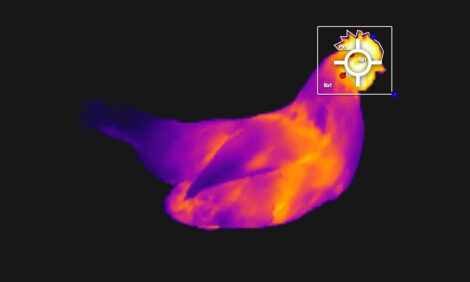



Storage of Wheat Does Not Impact Feeding Value
The performance of broilers fed freshly harvested wheat was better than those fed diets containing wheat stored for six months at either cold or ambient temperature, according to research from Northern Ireland. The reason for the difference remains unclear, however. The work is summarised by Jackie Linden for ThePoultrySite.Some researchers have reported that newly harvested wheat has a lower apparent metabolisable energy (AME) content than stored wheat and that the performance of broilers fed the diets is correspondingly reduced, while others have found the reverse. Dr Elizabeth McCann and colleagues at Agri-Food and Biosciences Institute in Belfast attempted to clarify this apparent discrepancy. She reported the experiment at the 2009 WPSA UK Branch Annual Meeting.
The six wheat varieties were grown on the same farm in the UK and harvested in September 2007. Some of the wheat was immediately formulated into wheat-based diets (65 per cent wheat) with soybean meal, full-fat soy, fish meal and soy oil plus vitamins and minerals. The diets were balanced to contain the same levels of lysine, methionine and threonine.
The diets were fed to 60 male Ross broilers in individual metabolism cages from 7 to 28 days of age. The birds were weighed weekly and their feed intake recorded. Excreta were collected for seven days, and birds were sacrificed at the end of the experiment in order to determine the viscosity of the ileal digesta.
In addition to the wheat diets fed fresh, the remaining wheat was stored whole at either 4°C or ambient temperature (around 16°C) for six months. The same experimental procedures were then followed as described for the fresh wheat.
The researchers found no significant interactions between wheat variety and storage and so Dr McCann presented only the main effects. She showed that the method of storage – cold versus ambient – did not affect broiler performance, energy metabolisability, dry matter retention or in vitro viscosity.
In terms of body weight, feed intake and feed conversion, the performance of birds offered the newly harvested wheat was significantly lower (P<0.001) than those fed the stored wheat.
Apparent metabolisable energy (AME) values were similar for all three diets.
In vitro ileal digesta viscosity was lower for the newly harvested wheat than that stored for six months at ambient temperature (P<0.01), with the cold-stored wheat giving an intermediate value.
There was an improvement in the performance of birds and ME:gain after storage, said Dr McCann in her conclusions. However, the reason for this difference is unclear because she found no differences in AME, ME:GE or DM retention between the diets. Probably, it was due to variation between trials.
Method of wheat storage had no effect on broiler performance or energy metabolisability in this experiment, said Dr McCann, neither did it significantly affect AME.
In previous experiments where effects were observed of wheat storage on broiler performance, it has been suggested that the differences may be linked to the effects of the activity of endogenous enzymes in the wheat during storage changing its chemical composition.
To investigate this possibility, the same researchers at Agri-Food and Biosciences Institute in Belfast measured some of the physical and chemical parameters of the same wheat samples, soon after harvesting and after three and six months of storage at 4 or 16°C. They presented the results as a poster at the same WPSA meeting.
There were significant storage effects on most of the parameters examined, i.e. gross energy, in vitro viscosity, crude protein, B-oil and the activities of enzymes alpha-amylase, beta-amylase (total and soluble) and xylanase (on a log10 basis). Total starch and soluble xylose, however, were unaffected by storage.
The authors noted, "Small changes in energy content of stored wheat with cold storage showing an increase in energy content compared to wheat at ambient conditions. Similar changes were noted for crude protein and B-oil."
However, they considered that these changes were too small to explain the differences observed in energy content, adding that further work is necessary to understand the effects of storage changes, if any, on animal performance.
References
McCann M.E.E., J. George and D.J. Kilpatrick. 2009. The effect of duration and method of storage of wheat on broiler performance and apparent metabolisable energy. British Poultry Abstracts, 5 (1): 6-8.
George J. and M.E.E. McCann, 2009. The effect of storage conditions and storage period on the chemical and physical parameters of wheat. British Poultry Abstracts, 5 (1): 11-12.








